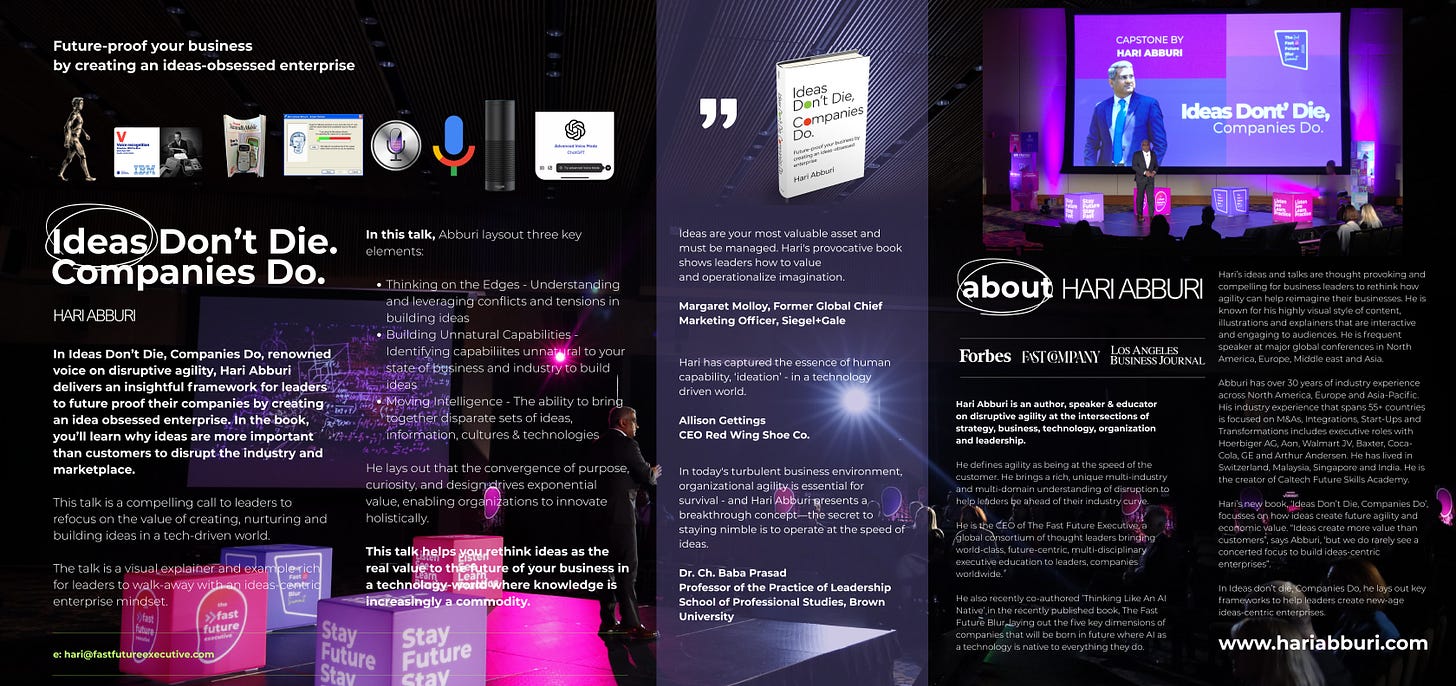“Ideas Don’t Die, Companies Do” Interview with Hari Abburi by Toby Chapman-Dave
The interview by Toby Chapman-Dawe opens with a brief introduction to Hari Abburi, CEO of The Fast Future Executive and author of Ideas Don’t Die, Companies Do: Future-Proof Your Business by Creating an Ideas-Obsessed Enterprise. The discussion centers on agility, which Abburi identifies as the central theme of his book. He explores how agility has evolved—from the era of linear manufacturing and conglomerates, focused on efficiency and capital allocation, to today’s AI-native world, where intangible assets such as data, IP, and ideas dominate value creation.
Click to Listen on Apple Podcasts, Spotify, Amazon Music
Abburi explains that traditional definitions of agility—doing things faster, better, cheaper—no longer suffice. In earlier digital-native enterprises, success depended on moving at the speed of the customer. However, in the AI-native era, where knowledge and intelligence move faster and are widely available, Abburi argues that the true differentiator is human creativity and ideas. Ideas, he claims, are now the most valuable asset, surpassing even customers in importance—not because customers are unimportant, but because ideas shape the future direction of organizations and their ability to adapt.
To illustrate, Abburi contrasts Kodak and Fujifilm. Both faced the same disruptive shift from analog to digital. While Kodak collapsed, Fujifilm reinvented itself by using its existing capabilities to diversify into pharmaceuticals, cosmetics, and industrial chemicals. By 2019, nearly half of Fujifilm’s revenue came from these new ventures. Abburi attributes Fujifilm’s success to leadership imagination and the courage to pursue new ideas, proving that survival depends on how companies interpret and act on their ideas—not merely on their assets or markets.
Abburi notes that nurturing ideas is difficult, requiring resilience, grit, and a long-term outlook. He praises companies like Apple, which invest in ideas that may take a decade to mature. The biggest obstacle to innovation, he argues, is corporate inertia—the entrenched culture and attachment to past successes that block new thinking. He describes this resistance as “cultural entropy.”
To help organizations overcome such inertia, Abburi introduces his framework called “Thinking on the Edges.” This tool helps leaders and teams evaluate where their ideas originate and what influences them. He identifies two key dimensions:
Passion for the existing company and its products—a form of internal attachment.
External influences and emerging ideas—from customers, adjacent industries, or ecosystems.
Effective agility, Abburi asserts, requires moving dynamically between these dimensions. Stagnation on either side—overattachment to the past or blind pursuit of novelty—can doom companies, as seen with Kodak or Toys R Us. The most agile companies constantly shift between internal passion and external disruption, refining their ideas to stay relevant.
In conclusion, Abburi leaves listeners with a powerful message: “Unimaginative leaders are the greatest threat to the future of your enterprise.” Neither technology, markets, nor culture pose as much danger as a failure of imagination. His book provides frameworks for leaders to nurture imagination, cultivate innovators, and reward creativity—what he calls the “innovator’s tree.” Ultimately, Abburi emphasizes that in an AI-driven world, human imagination remains the ultimate competitive advantage.
Invite Hari Abburi for a keynote






